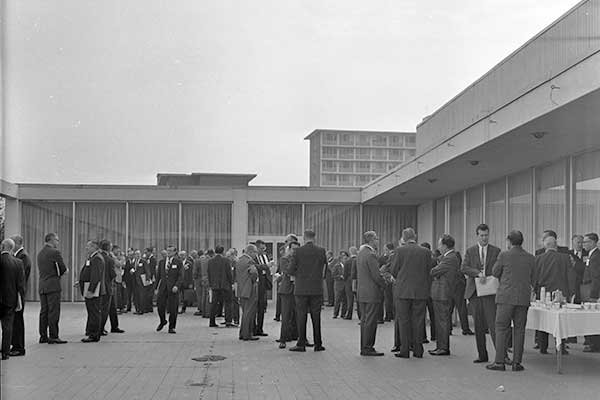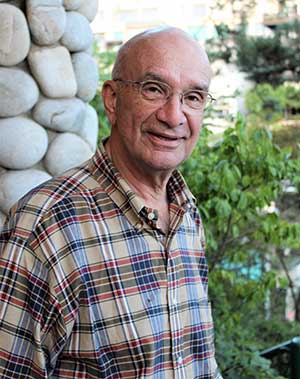
Attendees at November 1967’s Conference on Education for International Business enjoy a break on the University Center terrace.
By Stephen A. Zeff
Stephen A. Zeff is the Keith Anderson Professor of Accounting at Rice University’s Jesse H. Jones Graduate School of Business. He served on the accounting faculty of Tulane University’s School of Business from 1961 to 1978.
Now that I have reached the exalted age of 86 and am still teaching and doing research full-time at Rice University, I look fondly at my 17 years at Tulane
University, from 1961 to 1978, when I cut my teeth as an academic and helped lay the foundation for the business school’s international activities.
The Tulane business school was then located in the Norman Mayer Building, and there was a relaxed and friendly environment among the faculty, especially fostered by Dean Peter Firmin, and with the students. During my years at Tulane I made many friendships with students, partly because I spent countless hours advising them on planning their careers and lives — and beating them at paddleball!

Stephen A. Zeff
Howard Streiffer (BBA ’65, MBA ’66), Henry Lowentritt (BBA ’65, MBA ’66), Charles Snyder (BBA ’63), Barney Kogen (BBA ’64), Mark Schreiber (A&S ’80, MBA ’81) and Chuck Horstmann (MBA ’74) are among those whom I remember well and whose friendships have lasted even beyond my years at Tulane. Back in those days, faculty were not under the great pressure they are under today to become star researchers as quickly as possible. One could do the research he wanted and teach the way he thought was most effective, and there was ample time to come to know one’s students.
It was at Tulane in the early 1960s that I discovered my interest in accounting history research, and specifically how the profession’s attempt to establish accounting principles evolved to withstand the pressures from companies to weaken the standards and their implementation. Francis L. Miles, the Arthur Andersen recruiting partner at Tulane, generously enabled me to gain access to his firm’s vaunted Subject File, where I learned how the Accounting Principles Board was fighting off attempts to derail its standards on the Investment Tax Credit and Business Combinations and Goodwill during the 1960s. Actually,
Andersen’s national managing partner, Leonard Spacek, whom the Tulane business school honored in the mid-1960s by induction into its chapter of Beta Gamma Sigma (of which I was president), also became a great friend and opened doors to me to the firm’s rich historical records. In 1972, I published a 330-page monograph, Forging Accounting Principles in Five Countries: A History and an Analysis of Trends, which compared standard setting in the U.S., Canada, Mexico, England and Scotland. It was a pioneering international work on setting accounting standards, and without the support of Arthur Andersen it couldn’t have been done.
But it was even earlier that Tulane imprinted “international” in my DNA. In 1966, Dean C. Jackson Grayson Jr. wanted to establish exchange programs with Latin American business schools. After asking me to brush up my knowledge of Spanish by attending a Berlitz course, he sent me to Colombia, Argentina, Chile and Peru in 1967 to explore the possibilities. Later in 1967, Jack, who had been working with University of Chicago business dean George Shultz to study, with foundation support, how American business schools might best pursue programs in international business, persuaded me to draft a strategy paper — when I knew absolutely nothing about the subject — to cap their discussions. For weeks I was talking on the phone incessantly to business school deans and international business professors up and down the Americas in order to gather intelligence. Shuttling between Chicago and New Orleans, I finally wrote something that Jack and George could bless. And that led to the Conference on Education for International Business, a major conference held at Tulane in November 1967 to discuss the grand implications of the paper I had drafted from scratch. The well-publicized event, which Jack chaired and I ran, was the first international business conference ever held at Tulane, and it put Tulane’s Graduate School of Business on the map in terms of international business education.
Thus impregnated with the international virus, I obtained grants from USAID and the AICPA to take an extensive trip in 1968 to a dozen Latin American countries to establish a newsletter in Spanish that would assist the accounting profession in those countries to learn of developments outside their countries on which they could capitalize. With the indispensable help of my secretary, Janis Hays, and former student Rodolfo Sandoval García in Monterrey, I wrote and edited the quarterly Boletín Interamericano de Contabilidad for three years, on top of my teaching and research. Today, the Boletín continues to be published by the Asociación Interamericana de Contabilidad. It is one of my proudest achievements, and the Tulane business school supported me in the venture.
All of these activities fueled my international research and teaching interests, and these are among the vivid and pleasant memories I have of my years at Tulane.
